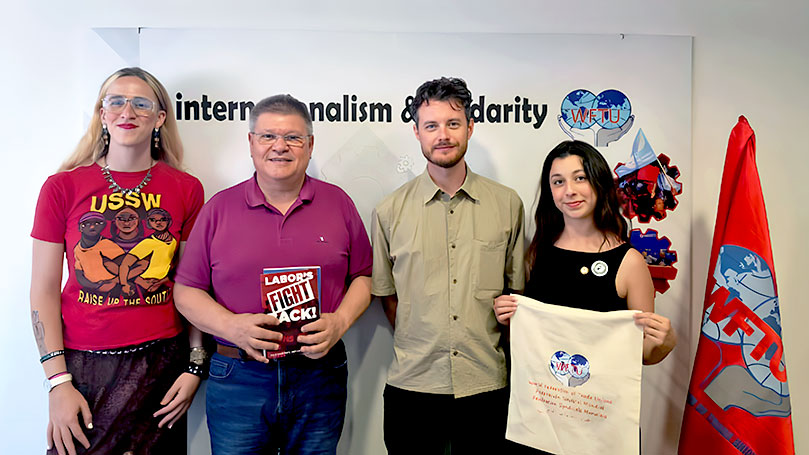
This report was delivered by Cameron Harrison, a member of the Communist Party USA National Labor Commission and National Committee, at the occasion of a bilateral meeting between the CPUSA and Progressive Party of Working People (AKEL) in Nicosia, Cyprus. The same report was given later in the week to the General Secretary of the World Federation of Trade Unions, Pambis Kyritsis, and the Executive Committee of the Pancyripan Federation of Labor (PEO).
Our party’s Labor Commission believes that addressing the challenges our working class faces involves stimulating new union organizing, implementing our policy of working-class concentration — where we target key workplaces and working-class neighborhoods, reconnecting with organizations such as the World Federation of Trade Unions, and building a strong, militant mass Communist Party in our country.
Historical setbacks
The U.S. labor movement’s decline in the second half of the 20th century was driven by anti-communist purges and capitalist offensives. After World War II, when unions internationally united under WFTU to advance worker solidarity, democracy, and peace, U.S. capitalists and anti-communist forces saw this internationalism as a threat. The U.S. labor movement was split, and the American Federation of Labor fractured international unity by helping to establish the so-called International Confederation of Free Trade Unions that aligned with imperialist foreign policy, rather than workers’ interests.
In the U.S., anti-communist purges removed our most effective labor leaders and unions like the United Electrical Workers and International Longshore and Warehouse Union from our main labor federation. Many remaining labor leaders promoted class collaboration over class struggle. Suppressing the militant unions and trade-union leaders weakened our working class’ unity and resistance to the rise of neoliberalism, austerity, and the rapid advances of monopoly capitalism.
Since the 1970s, more than 60 million U.S. workers have been displaced from their jobs due to mass layoffs, plant closures, and the decline of various manufacturing sectors. Following on the anti-labor maneuverings of Democrat Jimmy Carter, Republican Ronald Reagan crushed the Air-Traffic Controllers strike in 1981. Our union density plummeted as corporations continued to send jobs to low-wage, high-exploitation countries.
In the 1990s, Democrat Bill Clinton passed the worker-hated North American Free Trade Agreement (NAFTA) bill that further destroyed our union jobs. Although labor has tended to support the Democratic Party in national elections, both Democratic and Republican presidents have harmed labor.
The U.S. labor movement’s eventual alignment with imperialism during the Cold War mirrored its domestic retreat and inability to effectively counter reaction and racism. By supporting coups against left-wing governments and red-baiting at home, anti-communism contributed to our labor movement’s overall decline.
Today’s fightback
Unlike in the Cold War period, recent efforts correctly recognize that workers’ struggles in the U.S. are interconnected internationally. The National Labor Network for Ceasefire’s call to end U.S. military aid to Israel due to the genocide in Gaza shows labor demonstrating leadership in opposing imperialism. The Coalition of Black Trade Unionists are demanding an end to the U.S. blockade of Cuba, while unions like Service Employees, Electrical Workers, Sheetmetal Workers, and the Painters Union continue to resist attacks on immigrant workers. Rebuilding our labor movement will involve expanded international solidarity.
Our labor movements’ very survival depends on aggressive new union organizing and increased rank-and-file militancy.
Today, the majority of the working class in the U.S. is living paycheck-to-paycheck, facing severe poverty, immiseration, and neglect. Our labor movement is faced with escalating attacks by big business and the fascistic Trump administration — from dismantling workers’ collective bargaining rights to ICE raids targeting immigrant union organizers. Today, with 90% of U.S. workers non-unionized, our labor movements’ very survival depends on aggressive new union organizing and increased rank-and-file militancy.
The Trump administration’s current assaults on labor — including the largest union-busting campaign in history against federal workers, brutal immigration police raids, and the aggressive rule of finance capital — represents a clear anti-labor offensive to dismantle working-class power and democracy. His executive orders stripping basic trade union rights particularly target Black workers, who comprise almost 19% of public sector employees. Among Post Office employees, the number is closer to 30%. In the U.S., any anti-labor move by the capitalist class is also a racist move against the racially oppressed who are overwhelmingly working-class.
The arrest of Service Employees Union California President during an ICE raid exemplifies their anti-worker strategy of combining union-busting with racist repression. Ultimately, these attacks reflect capitalism’s crisis. As worker anger against the capitalist system grows, the capitalist class turns to repression through anti-labor and anti-democratic attacks, mass deportations, and criminalizing our right to organize and protest.
Yet workers are fighting back: through workplace strikes, the growth of rank-and-file workplace committees, community organizations, and the development of May Day demonstrations and massive peoples’ rallies on June 14 in opposition to Trump’s military parade, which saw millions of workers and our allies take to the streets.
Uniting the struggles for democracy, equality, workers’ rights, immigrant justice, and peace will unify our movement toward a broader struggle against capitalist exploitation and imperialism. The ruling class thrives on creating division, but our power lies in unity. The primary task for labor militants in the U.S. is to help organize the unorganized and fight for the leadership of the working class in the struggles against reaction and imperialism. We must continue our efforts to build a mass movement capable of confronting our own ruling class, defending our democratic gains, and forwarding the struggle for socialism.
Our party is organizing, strategizing, and taking concrete steps in our daily work to meet the challenges of our current political moment. We support with great enthusiasm the work being done in Cyprus by our comrades in AKEL and bring solidarity greetings from the U.S. We extend our gratitude and thanks for allowing us to share our thoughts.
Image: CPUSA labor leaders meet with WFTU General Secretary Pambis Kyritsis (CPUSA)

 Join Now
Join Now